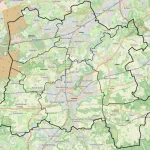UPDATE UK Gov Reach New Rural Broadband EU State Aid Agreement
The Government’s Broadband Delivery UK scheme has today established a new EU State Aid umbrella agreement, which will encourage smaller altnet ISPs to take part and allow new contracts to be signed as part of efforts to expand superfast broadband (30Mbps+) towards and beyond the 95% coverage goal.
Work on the new NBS agreement for the 2016 to 2020 period has been taking place since the old one expired at the end of June 2015 (details). BDUK’s CEO, Chris Townsend, recently indicated that the path to a deal hasn’t been easy, with the European Commission pushing for ALL suppliers in the bidding process to provide “full open access” networks (i.e. share cable ducts, masts, local loops) and for ALL bidders to share information on their existing infrastructure in the relevant intervention areas (details).
Advertisement
The EC also want to see procurements being as pro-competitive as possible (details), which among other things has fostered a greater focus on encouraging the involvement of smaller alternative network (altnet) ISPs that have previously struggled to be recognised.
Some altnet ISPs, such as Gigaclear, Call Flow and AB Internet, have already won BDUK contracts and this could now become more common as we start to move away from BT dominated deals. Mind you BT probably won’t shed too many tears as remote rural areas are very expensive to serve (extremely long payback period) and they can still take part where it makes economic sense.
Today’s decision also recognises the scheme as being compliant with EU competition law, and public bodies in the UK will not need to notify the Commission each time they wish to run a broadband procurement. Instead, they just need to demonstrate compliance with the scheme to BDUK. The new UK National Broadband Scheme will run until the end of 2020.
Ed Vaizey, Digital Economy Minister, said:
“Nine out of ten homes and businesses in the UK can already get superfast broadband and we are reaching thousands more every week. The Commission’s decision will help us to reach more properties more quickly, bringing a welcome boost in broadband speeds to communities across the UK.”
Margrethe Vestager, EC Commissioner for Competition, said:
“Today’s decision endorses UK plans to support the roll-out of high speed broadband infrastructure – it aims to bring faster internet to UK consumers and businesses in line with EU state aid rules.”
The delay in reaching an agreement has sadly left some local broadband improvement contracts in limbo and we should now expect to see quite a bit activity on this front, with councils pushing their plans through the tender process and signing off new deals accordingly.
Advertisement
We should also add that the new deal appears to define “superfast” as 30Mbps+ and not 24Mbps+ (the latter was used in many earlier BDUK contracts), which is in keeping with the EU’s Digital Agenda and recent tender proposals. In practical terms this only makes a very small difference to coverage (around 1% less UK coverage when using the 30Mbps+ figure vs 24Mbps+).
Summary of Key NBS Agreement Points
* Public money will be spent on underserved areas: The UK can fully fund the investment to roll-out NGA broadband in areas where no NGA infrastructure exists and where no private operator is willing to invest in such infrastructure without state aid in the next three years.
* To further ensure that public investment does not crowd out private investment, detailed mapping and public consultation exercises will be carried out with interested private operators.
* Fair chances for all bidders – big and small, regardless of technology: Aid will be awarded by way of tenders compliant with EU public procurement rules, respecting the principles of technological neutrality and also facilitating bids by smaller operators. This will ensure that the most advantageous offer is selected.
* Fair access to subsidised infrastructure through open access tenders: All interested operators should be able to access the subsidised infrastructure on equal and non-discriminatory terms. Furthermore, various mechanisms are in place to prevent wholesale access prices from being excessive. This will allow several network operators to obtain wholesale access and use the subsidised infrastructure to compete on services to the end consumers. The increase in network capacity is expected to stimulate market entry by service providers and the provision of a greater variety of services.
* Some areas may struggle to attract open access bids and if that happens then BDUK states that “reduced access” bids may be considered, although this is still subject to review until the end of 2016 and the details are not yet set in stone (here).
However one possible downside is that the new process seems to have become more complicated than the old one, which could create new headaches. Similarly smaller altnet providers tend to prefer closed networks as a means of protecting their otherwise vulnerable investment, but those wishing to bid will have to make sacrifices on that front and this might hamper interest.
Similarly there may be some concern that certain operators could enter the process and use it purely as a mechanism to see what infrastructure their rivals already have in a given area, which might conceivably discourage some operators from taking part.
Otherwise a non-confidential version of the new decision will be made available under the case number SA.40720 in the State Aid Register on the DG Competition website once any confidentiality issues have been resolved.
Advertisement
UPDATE 27th May 2016
Cable operator Virgin Media, which runs a closed network and doesn’t have the burden of needing to cater for the whole country (they only focus on the most lucrative 60% or so in urban areas), has criticised the new agreement.
Tom Mockridge, CEO of Virgin Media, said:
“The Government is doing the wrong thing using taxpayers’ money to subsidise BT when Virgin Media and many other operators are increasing the supply of superfast broadband with private capital. And BT is doing the wrong thing taking the money from a Government borrowing £72 billion this year.”
Virgin’s comment also overlooks how the new deal is focused more towards smaller altnet ISPs, although it remains to be seen how many providers are attracted to take it up.
Mark is a professional technology writer, IT consultant and computer engineer from Dorset (England), he also founded ISPreview in 1999 and enjoys analysing the latest telecoms and broadband developments. Find me on X (Twitter), Mastodon, Facebook, BlueSky, Threads.net and Linkedin.
« New Wireless ISP Might Solve Rotherhithe’s Slow Broadband in London
Sky UK Raises Standard FTTC Fibre Broadband Activation Fee »

















































Comments are closed